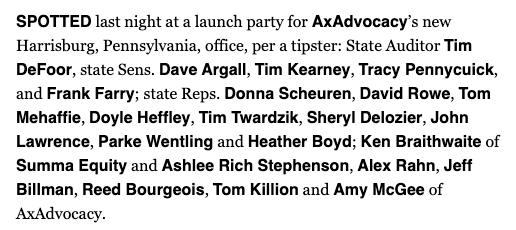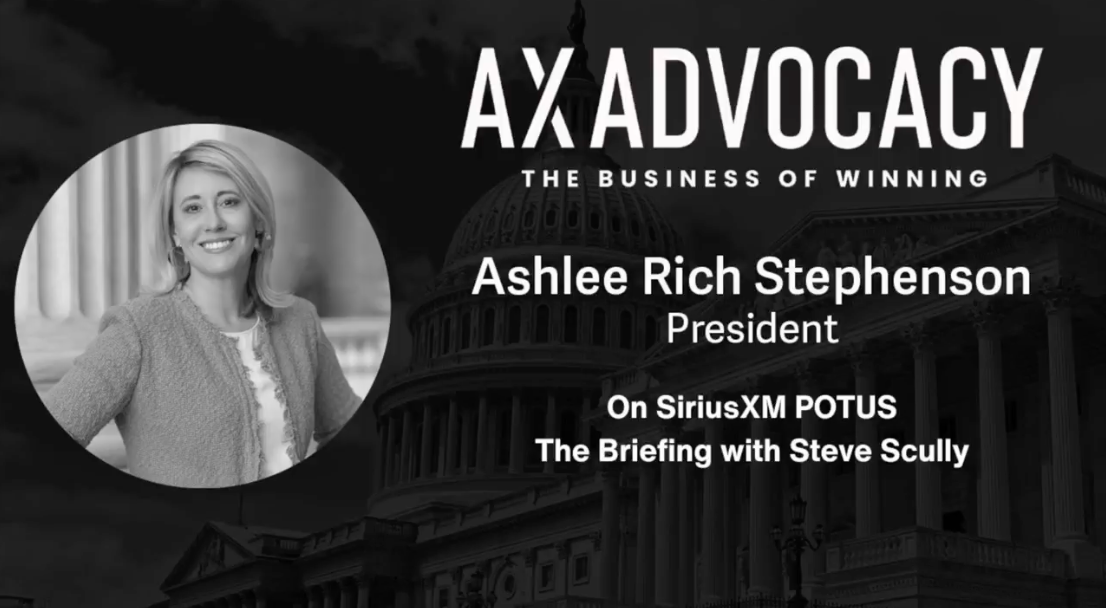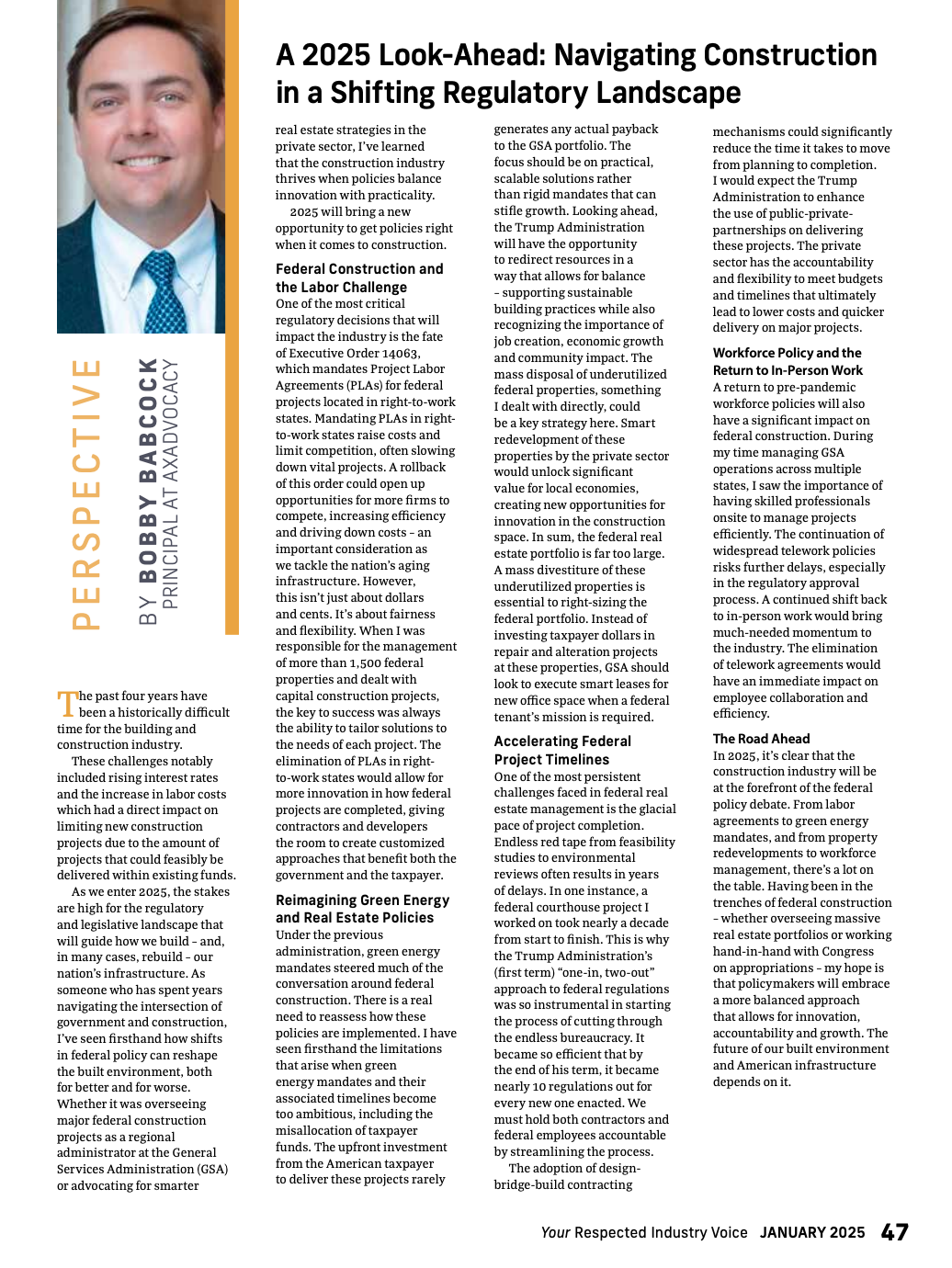Samantha Dravis joined Fox Business’s Mornings with Maria to discuss Republicans divided over Johnson’s speakership
Samantha Dravis joined Fox Business’s Mornings with Maria to discuss Republicans divided over Johnson’s speakership:
“If Republicans don’t implement President Trump’s agenda in the next two years, they will lose in 2026… because they didn’t do the job the voters told them they wanted to see done.”

On Monday, May 5, over 120 guests joined AxAdvocacy in Harrisburg, PA to celebrate the grand opening of our new Harrisburg office! This marks an exciting milestone in our continued expansion across the U.S. to advance state-level government relations and advocacy. We were honored to be joined by a bipartisan group of leaders, including State Auditor Tim DeFoor; Senators Dave Argall, Tim Kearney, Tracy Pennycuick, and Frank Farry; and Representatives Donna Scheuren, David Rowe, Tom Mehaffie, Doyle Heffley, Tim Twardzik, Sheryl Delozier, John Lawrence, Parke Wentling, and Heather Boyd, among many others. Special thanks to former Secretary of the Navy and U.S. Ambassador Ken Braithwaite for attending, and to our outstanding AxAdvocacy team: President Ashlee Rich Stephenson, Principal Alex Rahn, SVP Jeff Billman, Director Reed Bourgeois, Senior Advisor Thomas Killion, and Associate Amy McGee. We’re thrilled to grow and deepen our commitment to advocacy!

AxAdvocacy President Ashlee Rich Stephenson joined Steve Scully on SiriusXM POTUS to weigh in on the tariff debate happening in Washington right now. “"If President Trump can make his tax cuts permanent, that will bring a lot of confidence to the market and bring a lot of confidence to main streets." Listen to the clip below:

AxAdvocacy Principal of Communications Chris Pack spoke with USA Today on the early start to the 2026 midterm elections. Speaking about Defending America PAC's efforts to support Congressman Brian Fitzpatrick, Pack noted that the campaign cycle has become nonstop. “It’s definitely become a full-contact sport,” he said. “And it seems there’s no longer an off-season.” Read the full article below: Midterms aren't as far away as you think. The fight has already started. USA Today Chris Brennan April 11, 2025 https://www.usatoday.com/story/opinion/columnist/2025/04/11/democrats-congress-midterms-2026-election/83014650007/ The 2026 midterm elections, which will determine which political party controls the U.S. House and Senate, are still nearly 19 months away . But those fights are already turning chippy. Democrats, eager to find a way back from political relegation, are in a solid position to retake the House next year. Republicans, keen on keeping control in both chambers of Congress, are already teeing off on Democratic contenders. A prime example is U.S. Rep. Brian Fitzpatrick , a Pennsylvania Republican seeking a sixth term next year in a purple congressional district in the suburbs just north of Philadelphia. Fitzpatrick is just one of three Republicans in the House who won in districts where Democratic presidential nominee Kamala Harris beat Republican opponent Donald Trump in November's election. He's accustomed to having a target on his district . Next year will be no different. Fitzpatrick has for years bedeviled activists on both ends of the political spectrum. Ardent Trump supporters in the district hate to hear him described as a conservative. Progressives there are driven to distraction when Fitzpatrick is called a moderate. This has worked for Fitzpatrick for nearly a decade. But now, he's tied again to a deeply unpopular president. Fitzpatrick's only tough election was in 2018 , a midterm election. Guess who was president then. Democrats have chosen which GOP seats they want to flip The Democratic Congressional Campaign Committee on April 8 named Fitzpatrick's seat one of 35 districts held by Republicans targeted to flip next year . This was, of course, an advantageous week for that sort of messaging, giving Trump's flippity-floppity flirtation with economic calamity, concerns about federal budget cuts starving off access to programs like Social Security and Medicaid, and sinking approval ratings for Republicans in Congress. The Center for Politics at the University of Virginia on April 10 listed Fitzpatrick's seat as one of 13 held by Republicans across the country considered a "toss-up" next year. Part of that rests on historical precedent. For decades, with the exception of 2002, the party that holds the White House has suffered midterm election losses in Congress. Kyle Kondik from The Center for Politics told me he doesn't see Fitzpatrick as "a top-tier Democratic target" because he hasn't faced a difficult challenge since the 2018 election. Even so, he added that if Vice President Harris had won the presidency last November, Fitzpatrick's seat would have been rated a "likely Republican" win this week. Kondik, writing April 10 about the midterm elections, noted that Democrats " have been punching above their weight in special elections " this year, which echoes back to party wins in 2017, the first year of Trump's first term, ahead of a successful 2018 midterm cycle. "Democrats became favorites to flip the House as soon as Trump won, and what has happened since then has not really changed that assessment," Kondik wrote. The Pennsylvania midterm election getting attention For a potential congressional matchup set way down the road on Nov. 3, 2026, the ominous text messages I've received in the past week make the race sound imminent. Bob Harvie , a Democrat who chairs the Bucks County Board of Commissioners, has entered his party's primary to challenge Fitzpatrick. And he, too, was soon wearing a target. The National Republican Congressional Committee fired off an early salvo April 8 knocking Harvie for how Bucks County spent national money from a national opioid settlement. And Defending America, a super PAC that describes itself as committed to protecting Fitzpatrick "from extremist challenges on both the far-left and far-right," came out swinging at Harvie with texts calling him a "clown" and "a corrupt, do-nothing partisan hack." Having a Republican in the 1st Congressional District and a Democrat as chair of the county commission shows how politically competitive the district is, where 42% of the registered voters are Republicans , 40% are Democrats and the rest are independents or members of smaller parties. You might assume a super PAC seeking to help Fitzpatrick would be well funded by deep-pocket conservative groups. You'd be wrong. Federal Election Commission reports show that political action committees for unions representing carpenters, laborers, plumbers, letter carriers and airline pilots were the biggest contributors to Defending America in 2023 and 2024. Trump is already promising big midterm wins. Not so fast. Chris Pack, a longtime Republican political consultant and spokesperson for Defending America, told me the super PAC was set up in 2023 to help Fitzpatrick fend off a primary challenger from the right. I asked him if it felt like the midterms were off to an early start. He agreed. "It's definitely become a full-contact sport," Pack told me. "And it seems there's no longer an off-season." Kondik said money flooding into races early accelerates the cycle to where it hardly starts or stops. "There's so much money in the political system that it's never too early to see attacks," Kondik said. "There really is effectively a permanent campaign for the House." With the cycle already churning, Fitzpatrick and other potentially vulnerable Republicans will face certain scrutiny from voters and special interests looking to see how close to ‒ or distant from ‒ he is to a controversial president who could serve as an effective deadweight on his campaign. Talk about a toss-up. Trump, speaking April 8 at the National Republican Congressional Committee's annual fundraiser , promised his party "a tremendous, thundering landslide" in the midterm elections in a rambling speech that oscillated between old lies about the 2020 election and new boasts about the tariffs he had just slapped on countries around the world. A day later, Trump paused those tariffs for 90 days as panic in the stock markets metastasized into the bond market , giving the president's advisers some serious agita. Vulnerable Republicans like Fitzpatrick now have nearly 19 months of that sort of inevitable chaos to weather. Progressives have failed to topple him. Maybe Trump is up to the task this time?

As seen in this morning's Hotline, ahead of several high-stakes decisions before the Supreme Court, AxAdvocacy has developed a presentation deck offering an overview of key cases and an analysis of how their outcomes could affect organizations and industries. This resource is available to download here: https://lnkd.in/eA_3Qdfm

As the Supreme Court’s term continues, several high-stakes decisions are expected this spring and early summer that may have far-reaching implications for the business and industry landscape. Corporate leaders and stakeholders should stay informed about the potential ripple effects these rulings may have across various sectors. To help our clients and colleagues prepare, the AxAdvocacy team has developed this presentation deck on pending rulings. It offers a concise overview of key cases on the Court’s docket and analyzes how their outcomes could affect organizations and industries. This resource is designed to serve as a roadmap for anticipating legal challenges and identifying strategic considerations. Key issues the Court is set to address—and are highlighted in the deck—include: • Employer obligations under the ADA • False claims to federal regulators • Court forum shopping • Allegations of reverse discrimination • Foreign governments using the U.S. legal system • Liability of gun manufacturers • Congressional redistricting • Clean Water Act & Clean Air Act interpretations • The scope of federal agency power • Tax exemptions for religious organizations • Parental rights over school content • Public funding for religious schools By staying ahead of these developments, businesses can better navigate the shifting legal landscape and plan with confidence. Click the image below to access the full presentation.

AxAdvocacy Principal of Communications Chris Pack spoke with USA Today on the early start to the 2026 midterm elections. Speaking about Defending America PAC's efforts to support Congressman Brian Fitzpatrick, Pack noted that the campaign cycle has become nonstop. “It’s definitely become a full-contact sport,” he said. “And it seems there’s no longer an off-season.” Read the full article below: Midterms aren't as far away as you think. The fight has already started. USA Today Chris Brennan April 11, 2025 https://www.usatoday.com/story/opinion/columnist/2025/04/11/democrats-congress-midterms-2026-election/83014650007/ The 2026 midterm elections, which will determine which political party controls the U.S. House and Senate, are still nearly 19 months away . But those fights are already turning chippy. Democrats, eager to find a way back from political relegation, are in a solid position to retake the House next year. Republicans, keen on keeping control in both chambers of Congress, are already teeing off on Democratic contenders. A prime example is U.S. Rep. Brian Fitzpatrick , a Pennsylvania Republican seeking a sixth term next year in a purple congressional district in the suburbs just north of Philadelphia. Fitzpatrick is just one of three Republicans in the House who won in districts where Democratic presidential nominee Kamala Harris beat Republican opponent Donald Trump in November's election. He's accustomed to having a target on his district . Next year will be no different. Fitzpatrick has for years bedeviled activists on both ends of the political spectrum. Ardent Trump supporters in the district hate to hear him described as a conservative. Progressives there are driven to distraction when Fitzpatrick is called a moderate. This has worked for Fitzpatrick for nearly a decade. But now, he's tied again to a deeply unpopular president. Fitzpatrick's only tough election was in 2018 , a midterm election. Guess who was president then. Democrats have chosen which GOP seats they want to flip The Democratic Congressional Campaign Committee on April 8 named Fitzpatrick's seat one of 35 districts held by Republicans targeted to flip next year . This was, of course, an advantageous week for that sort of messaging, giving Trump's flippity-floppity flirtation with economic calamity, concerns about federal budget cuts starving off access to programs like Social Security and Medicaid, and sinking approval ratings for Republicans in Congress. The Center for Politics at the University of Virginia on April 10 listed Fitzpatrick's seat as one of 13 held by Republicans across the country considered a "toss-up" next year. Part of that rests on historical precedent. For decades, with the exception of 2002, the party that holds the White House has suffered midterm election losses in Congress. Kyle Kondik from The Center for Politics told me he doesn't see Fitzpatrick as "a top-tier Democratic target" because he hasn't faced a difficult challenge since the 2018 election. Even so, he added that if Vice President Harris had won the presidency last November, Fitzpatrick's seat would have been rated a "likely Republican" win this week. Kondik, writing April 10 about the midterm elections, noted that Democrats " have been punching above their weight in special elections " this year, which echoes back to party wins in 2017, the first year of Trump's first term, ahead of a successful 2018 midterm cycle. "Democrats became favorites to flip the House as soon as Trump won, and what has happened since then has not really changed that assessment," Kondik wrote. The Pennsylvania midterm election getting attention For a potential congressional matchup set way down the road on Nov. 3, 2026, the ominous text messages I've received in the past week make the race sound imminent. Bob Harvie , a Democrat who chairs the Bucks County Board of Commissioners, has entered his party's primary to challenge Fitzpatrick. And he, too, was soon wearing a target. The National Republican Congressional Committee fired off an early salvo April 8 knocking Harvie for how Bucks County spent national money from a national opioid settlement. And Defending America, a super PAC that describes itself as committed to protecting Fitzpatrick "from extremist challenges on both the far-left and far-right," came out swinging at Harvie with texts calling him a "clown" and "a corrupt, do-nothing partisan hack." Having a Republican in the 1st Congressional District and a Democrat as chair of the county commission shows how politically competitive the district is, where 42% of the registered voters are Republicans , 40% are Democrats and the rest are independents or members of smaller parties. You might assume a super PAC seeking to help Fitzpatrick would be well funded by deep-pocket conservative groups. You'd be wrong. Federal Election Commission reports show that political action committees for unions representing carpenters, laborers, plumbers, letter carriers and airline pilots were the biggest contributors to Defending America in 2023 and 2024. Trump is already promising big midterm wins. Not so fast. Chris Pack, a longtime Republican political consultant and spokesperson for Defending America, told me the super PAC was set up in 2023 to help Fitzpatrick fend off a primary challenger from the right. I asked him if it felt like the midterms were off to an early start. He agreed. "It's definitely become a full-contact sport," Pack told me. "And it seems there's no longer an off-season." Kondik said money flooding into races early accelerates the cycle to where it hardly starts or stops. "There's so much money in the political system that it's never too early to see attacks," Kondik said. "There really is effectively a permanent campaign for the House." With the cycle already churning, Fitzpatrick and other potentially vulnerable Republicans will face certain scrutiny from voters and special interests looking to see how close to ‒ or distant from ‒ he is to a controversial president who could serve as an effective deadweight on his campaign. Talk about a toss-up. Trump, speaking April 8 at the National Republican Congressional Committee's annual fundraiser , promised his party "a tremendous, thundering landslide" in the midterm elections in a rambling speech that oscillated between old lies about the 2020 election and new boasts about the tariffs he had just slapped on countries around the world. A day later, Trump paused those tariffs for 90 days as panic in the stock markets metastasized into the bond market , giving the president's advisers some serious agita. Vulnerable Republicans like Fitzpatrick now have nearly 19 months of that sort of inevitable chaos to weather. Progressives have failed to topple him. Maybe Trump is up to the task this time?

AxAdvocacy principal Bobby Babcock wrote a piece for Construction News and Review Magazine on construction regulations. The construction industry has faced significant challenges over the past four years due to rising costs and regulatory hurdles, making 2025 a critical year for reforming policies to enhance competition, efficiency, and innovation in infrastructure development. Read more here: https://mycnr.com/wp-content/uploads/2024/02/CNR_JJAN25_web.pdf



